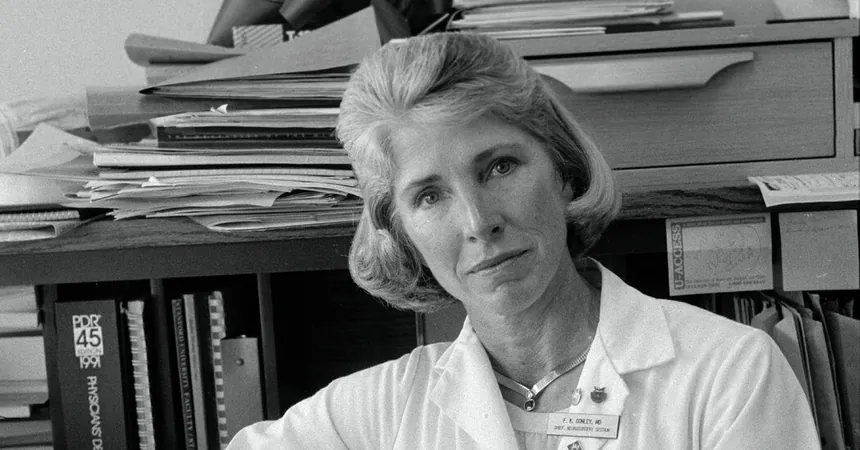
Legacy of Frances Conley: Trailblazing Neurosurgeon Who Fought Against Sexism Dies at 83
2024-10-11
Author: Chun
Dr. Frances Conley, a pioneering figure in neurosurgery and vocal advocate against sexism in medicine, passed away at the age of 83 on August 5, 2023. Her death was attributed to complications from dementia, and was officially announced by Stanford University in late September.
In 1991, Dr. Conley made headlines when she resigned from her prestigious position at the Stanford University School of Medicine, citing the untenable working conditions created by rampant sexism in her field. At that time, she was one of the nation’s few female neurosurgeons, facing relentless harassment from her male counterparts for years. Unfortunately, her experience included inappropriate physical advances and derogatory comments that undermined her professional contributions.
Dr. Conley, who initially attempted to navigate the male-dominated environment by putting up with this behavior, found her breaking point when a particularly egregious colleague was promoted to department head. In her own words, she felt it was impossible to pretend to “be one of the boys” any longer, expressing her frustrations in an opinion piece: “I wanted my dignity back.”
Specializing in spinal surgeries and researching the immunology of brain tumors, Dr. Conley ultimately became a catalyst for change not only in her immediate workplace but across the medical field. Her resignation stirred a significant dialogue surrounding sexual harassment that empowered other women in medicine who had similarly suffered in silence. In her impactful memoir, "Walking Out on the Boys," she reflected on her journey and the realization that her silence had contributed to a system that allowed such behavior to flourish.
Her actions became a turning point during a time when the #MeToo movement was only on the horizon. Female medical professionals reached out to her to express their gratitude, recounting their own experiences with harassment and demanding change within their institutions. The collective voice of these women began creating ripples of awareness and set the stage for future advocacy around gender issues in the medical field.
Born on August 12, 1940, in Palo Alto, California, Frances grew up on the Stanford campus, influenced by her father, a professor. She attended Bryn Mawr College before transferring to Stanford, where she became the first female surgical resident in 1966. Initially aspiring for a career in plastic surgery, she found her passion in neurosurgery after witnessing the life-changing impacts of the discipline on her patients.
Throughout her life, she balanced her demanding medical career with personal commitments, marrying Philip Conley in 1963. Together, they shunned traditional expectations, opting not to have children to prioritize Frances's career aspirations.
Despite retiring from surgery long before her death, Dr. Conley's legacy remains significant. Statistics reveal a persistent gender gap in neurosurgery; as of 2021, only 8.2% of practicing neurosurgeons in the U.S. were women—up from just under 6% in 2008. Her influence continues to resonate, exemplified by Dr. Odette Harris, the first woman promoted to full professor of neurosurgery at Stanford since Dr. Conley.
Dr. Conley's dedication to patient care, academic excellence, and systemic reform underscores her status as a trailblazer in neurosurgery. As we reflect on her life and contributions, it serves as a reminder that while progress has been made, the fight for equality and respect in medicine is far from over. How many more Frances Conleys are there, waiting for their stories to be told?
 Brasil (PT)
Brasil (PT)
 Canada (EN)
Canada (EN)
 Chile (ES)
Chile (ES)
 España (ES)
España (ES)
 France (FR)
France (FR)
 Hong Kong (EN)
Hong Kong (EN)
 Italia (IT)
Italia (IT)
 日本 (JA)
日本 (JA)
 Magyarország (HU)
Magyarország (HU)
 Norge (NO)
Norge (NO)
 Polska (PL)
Polska (PL)
 Schweiz (DE)
Schweiz (DE)
 Singapore (EN)
Singapore (EN)
 Sverige (SV)
Sverige (SV)
 Suomi (FI)
Suomi (FI)
 Türkiye (TR)
Türkiye (TR)